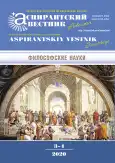The continuity of the byzantine church tradition in Russian book culture
- Authors: Afanasevsky V.L.1
-
Affiliations:
- Samara Law Institute of the Federal Penitentiary Service of Russia
- Issue: Vol 20, No 3-4 (2020)
- Pages: 35-40
- Section: Philosophical sciences
- URL: https://journal-vniispk.ru/2410-3764/article/view/56976
- DOI: https://doi.org/10.17816/2072-2354.2020.20.2.35-40
- ID: 56976
Cite item
Full Text
Abstract
The article attempts to outline the trend of Russian scribes to perceive the Byzantine Church tradition. The author also builds a view that the movement goes from anticipating the inheritance of the traditions of the Christian Byzantine Church and statehood to the process of direct perception of the Byzantine Church state power and authority by the Russian Church. The Byzantine theologians interpreted the split of Christianity as the appearance, along with the true Orthodox Church of the Western Church, in which a person was the individual desacralization. After the fall of Byzantium, it was the destined Russian Orthodox Church that acted as the guardian of the canonical and dogmatic tradition of true Orthodoxy. And, first of all, this was expressed in the continuity of the tradition integrity of the spiritual and secular authorities. The author considers the way of expressing these processes in the theological and political treatises of the aborning Russian book tradition, which gave rise to the formation of a specific Russian ideocratic project. The ideology of Moscow as the Third Rome, launched by Russian scribes, became possible due to the fact that Orthodox Russia has assumed the most important sacred mission.
Full Text
##article.viewOnOriginalSite##About the authors
Vadim L. Afanasevsky
Samara Law Institute of the Federal Penitentiary Service of Russia
Author for correspondence.
Email: adler_vadim@mail.ru
Candidate of Philosophical Sciences, Associate Professor at the Department of Theory and History of State and Law
Russian Federation, SamaraReferences
- Дугин А.Г. Пути Абсолюта // Дугин А.Г. Абсолютная родина. – М.: АРКТОГЕЯ-центр, 1999. – С. 5–206. [Dugin AG. Puti Absolyuta. In: Dugin AG. Absolyutnaya rodina. Moscow: ARKTOGEYA-centr; 1999. P. 5-206. (In Russ.)]
- Иларион. Слово о Законе и Благодати. – М.: Столица, Скрипторий, 1994. – 146 с. [Ilarion. Slovo o Zakone i Blagodati. Moscow: Stolitsa, Skriptoriy; 1994. 146 p. (In Russ.)]
- Киселева М.С. Учение книжное: текст и контекст древнерусской книжности. – М.: Индрик, 2000. – 256 с. [Kiseleva MS. Uchenie knizhnoe: tekst i kontekst drevnerusskoy knizhnosti. Moscow: Indrik; 2000. 256 p. (In Russ.)]
- Лосев А.Ф. Античная философия истории. – М.: Наука, 1977. – 207 с. [Losev AF. Antichnaya filosofiya istorii. Moscow: Nauka; 1977. 207 p. (In Russ.)]
- Лосев А.Ф. Хаос / Мифы народов мира. Т. 2. – М.: Российская энциклопедия, 1994. – С. 579–581. [Losev AF. Khaos. In: Mify narodov mira. Vol. 2. Moscow: Rossiyskaya entsiklopediya; 1994. P. 579-581. (In Russ.)]
- Прохоров Г.М. Памятники переводной и русской литературы XIV–XV веков. – Л.: Наука, 1987. – 293 с. [Prokhorov GM. Pamyatniki perevodnoy i russkoy literatury XIV–XV vekov. Leningrad: Nauka; 1987. 293 р. (In Russ.)]
- Розанов В.В. Русская Церковь. Сочинения в двух томах. Т. 1. – М.: Правда, 1990. – С. 327–354. [Rozanov VV. Russkaya Cerkov’. Sochineniya v dvukh tomakh. Vol. 1. Moscow: Pravda; 1990. P. 327-354. (In Russ.)]
Supplementary files






